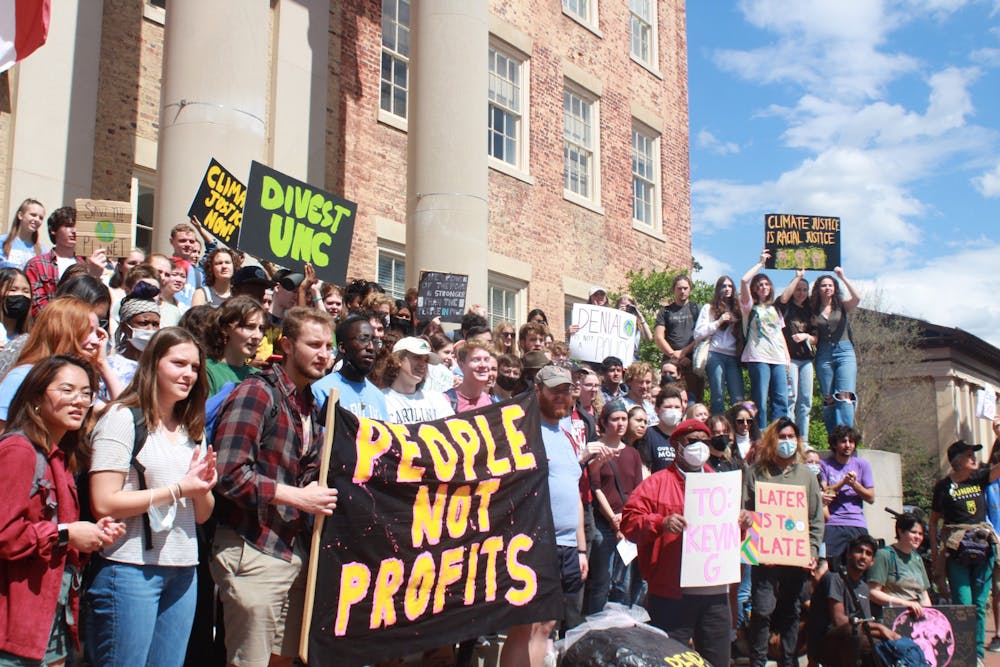The University had previously announced in 2010 a plan to be coal-free by 2020 but abandoned the deadline citing technological and financial restrictions.
'People Not Profits'
Attendees of the climate strike first gathered in The Pit, where organizers encouraged participants to “fill up the voicemail box” of the chancellor's office. Participants were asked to leave messages demanding that UNC leaders expedite the University's transition to renewable energy and set clear deadlines for their Climate Action Plan.
Nearly all participants in the demonstration pulled out their phones and called the chancellor’s office, stated their name and read the provided script calling for action.
Attendees then marched from The Pit and gathered in front of the South Building where they chanted phrases like “No more coal, no more oil, keep that carbon in the soil” and “‘What do we want?’ ‘Climate justice!’ ‘When do we want it?’’ Now!’”
Several students gave speeches about the urgency of the climate crisis.
After reading their list of demands in front of the building, organizers delivered the list to the office of the chancellor along with a large paper mache lump of coal with the words “People Not Profits” written on it.
Neil Doughty, a graduate student at UNC, said he helped organize the strike.
The lump of coal symbolized the “ugly image” of values that our society holds in capitalism, which prioritizes profits over people, Doughty said.
“The coal is there to say that if we generate enough pressure as students, with pressure, coal turns into a diamond,” he said. “If we generate enough pressure as students, then maybe we can turn this kind of ugly value system that we have now into something beautiful.”
Chapel Hill resident Amelia Covington also said she helped organize the event.
In terms of turnout, Covington said that this was the most successful climate strike she has been a part of — after years of organizing professionally and as a student at American University.
To get the day's news and headlines in your inbox each morning, sign up for our email newsletters.
Seeing students and members of the community come together at the event was really encouraging, she said.
“It's really up to the young people to guide this movement because we will be inheriting the Earth,” Covington said. “Our generation and future generations are going to feel the effects of the climate crisis.”
UNC junior Tariro Magarira spoke about the urgency of the climate crisis, highlighting how Black and Indigenous communities experience the brunt of climate issues.
He spoke about his own experiences, and the effects of climate change in the global south, including in his native country of Zimbabwe.
“Whenever we are advocating for environmental science to be equitable, we need to focus all of it on Black and Indigenous voices,” Magarira said.
First-year Sarah Zhang attended the strike with a sign that read, “Change policies, not the climate.”
Zhang said the message she was trying to spread was that corporations are responsible for the bulk of climate change, not individuals and their behaviors.
“As an institution, UNC is responsible for making those changes such as going more carbon neutral and switching to more renewable energy sources,” she said. “Not having individual people focus on going vegan or telling students that they’re the ones who are supposed to be responsible for making those changes.”
Doughty said he hopes that the energy of the strike will carry beyond Friday's event.
“Protesting isn't about the single event, as much as it's about practicing standing up and practicing showing up,” he said.
university@dailytarheel.com




